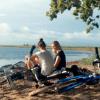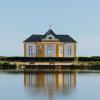
Nature highlights on the Baltic Sea Cycle Route
Feeling the wind in your hair as you ride along the coast beside sandy beaches and quiet islands is one of the best reasons to cycle the Baltic Sea Cycle Route. All along the route, you can take detours to discover dolphins, birds and nature reserves too.
It's all part of the Danish experience - and it's all best seen by bike. Nature is a constant delight along the N8 cycle route, offering everything from impressive views of fjords, cosy country lanes and plenty of wildlife (including our adorable red squirrels) inbetween. It all combines to offer a delightful take on our little island nation. The N8 winds a route through our landscape, across bridges and islands and up and down our slight inclines, which we like to call mountains. These are the nature highlights that you can visit along the way, and are just a handful of the many options out there.
South Zealand & Møn
The cliffs of Møn
Møns Klint, the Cliffs of Møn, are one of Denmark's most impressive natural sights. These 128-metre-high chalk cliffs rise out of clear turquoise-green water along 7 km of coastline - and there's plenty to explore nearby. Jump off your bike and walk down the 497 steps from the top of the cliff to the beach, enjoy the view of the surrounding forest from the various points along the way through Klinteskoven, comb the beach for 70 million-year-old fossils, belemnites and amber, or visit GeoCenter Møns Klint to learn how Denmark was created.
Lolland-Falster
Naturpark Nakskov Fjord
Nakskov Fjord is Denmark's oldest fjord, and can be explored in a number of ways. You can walk or cycle to the tip of the peninsula for fjord views, or choose to experience it by boat. It has ten islands to explore, the largest of which is Enehøje, where you'll find an unusually hilly terrain and a varied ecosystem. The island is also called Peter Freuchens Ø, named after a Greenland explorer who lived on the island from 1926 to 1940 and built an arch from the bones of a whale jaw on the highest point of the island.
Naturpark Maribosøerne
Spot sea eagles, take boat trips on the lake and look out for butterflies as you explore the Maribo Lakes Nature Park, not far from the N8 route. There are plenty of activities, from hiking and angling to horse riding and kayaking, and a lot of birdlife to spot along the way as well.
Fyn
The half island of Helnæs
Helnæs is a small peninsula with a unique scenery, a cultural life and an exciting past. The name stems from the word ’holy’ and may have been a place where the prehistoric gods were worshipped. The bike route along the sea between Fyn and the peninsula is particularly memorable, and you can often meet fishermen, kite and windsurfers at the water’s edge. At Helnæs you can enjoy nature both at sea and on land. Bring your walking shoes and take a walk in the Bobakker or enjoy a delicious meal at the Helnæs Kro.
Ærø
The island of Ærø will be one of your first stops along the N8 route, and its scenery is the star of the show. Enjoy gently shelving beaches set against the backdrop of the South Fyn Archipelago, plus wild and rugged stretches of coastline against the Baltic Sea. A ramble on Ærø is an obvious choice for nature lovers: why not try Vitsø, where you'll find geese and ducks in the salt meadows, wetlands and waterholes? If you like fishing, the sea trout in the waters around the island are keen to jump into your nets.
Langeland
Langeland island is your next stop. 52km long and only 11km at its widest, the island is connected to Siø, Tåsinge and Fyn by bridges and has an extensive wildlife habitat. There is so much to discover on Langeland (set an afternoon or more aside): visit the wild horses, explore the hat hills or dedicate a day to bird watching. Migrating birds love Langeland’s fauna and are especially fond of the southern tip of the island. You could also swap your bike for a diving suit, a fishing rod or swimwear at Ristinge Beach.
Lillebælt
Nature Park Lillebælt
Denmark's largest nature park is an absolute must-see on your route. You can't miss it - the N8 runs alongside it with views all the way on the stretch between Middelfart and Fredericia. Lillebælt has the world’s most dense population of Harbour Porpoises, and you can see them on a whale safari from Fredericia or Middelfart. You can also discover coastal birds at Nature Park Lillebælt, one of the most important breeding and resting grounds for them in Denmark. It's easy to get close to nature by bike and on foot.
Hindsgavl Peninsula
Hindsgavl Nature Reserve and Deer Park is just outside Middlefart and is a good place to stop for an afternoon out of the saddle. There is a fantastic 10km walk along the coast from the old harbour to Teglgård called ’pynten rundt’ that takes around four hours, or you could explore the Deer Park, with its large population of red and fallow deer seen on the plains and in the forests. You’ll also find a play area and a place to cook food over a fire near the Nature Centre.
Sønderjylland
Knivsbjerg
Knivsbjerg (Knife Mountain) is 97 m high.The only explanation we can have for this name is that Denmark is in general very flat. Take a detour from the N8 to enjoy the views over the hilly terrain around Genner Bay and over to Fyn. The area is a meeting place for the German population in Sønderjylland/Northern Schleswig, who gather here each year to celebrate. The hill has a memorial wall and a viewing platform at the top.












